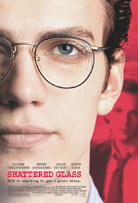Shattered Glass
| Aside from its trite pun of a title, Billy Ray’s Shattered Glass is a scintillating morality play about the lengths to which some people will go in order to be accepted. The film is based on the true story of Stephen Glass, who has been called “the most sustained fraud in modern journalism.” A rising star who was already an associate editor for The New Republic by the time he was 25, Glass was eventually revealed as having fabricated in part or in whole a staggering 27 of his articles. Shattered Glass aims for emotional resonance, rather than psychological understanding. First-time director Billy Ray, who also wrote the screenplay from a Vanity Fair article by Pulitzer Prize-winner Buzz Bissinger, doesn’t attempt to explain Glass’s behavior through childhood trauma or parental issues; rather, he focuses squarely on the enormous pressure put on young professionals like Glass and how that, combined with his eager-to-please disposition, led him on a two-year odyssey of lies and cover-ups that eventually led to his disgrace. The vast majority of Shattered Glass takes place within the office of The New Republic, and we see Glass largely through the eyes of his coworkers. We never see him concocting his schemes, writing the articles, or devising methods to skirt the fact checkers, although we do see re-enactments of some of his fabrications (including the one that got him busted, about a 15-year-old computer hacker hired by a software developer into whose system he broke) as he tells them to the other writers during conferences. If one were to go into the film without any knowledge of the real-life events, it might play as something of a mystery, as Glass’s culpability is never completely revealed until the film’s final frames. This is particularly true of the scenes that take place in the office of the online magazine Forbes Digital Tool, where one of its writers (Steve Zahn) unearths Glass’s trail of fabrications when he attempts to follow up on one of his stories. However, as Ray was certainly aware that virtually anyone who sees this film already knows the outcome, his narrative structure works to align us with the other characters, thus allowing us to see Glass’s external reactions only, denying us his inner subjectivity. Interestingly enough, I think this works to draw us in closer to Glass and to feel for him, particularly when the walls start closing in around him and his denials, excuses, and further lies (which include going so far as to fabricate notes, create fake voice mails, and design a web site for a company that didn’t exist) become more panicked and pathetic. Glass is portrayed by Hayden Christensen, best known for playing Anakin Skywalker in Star Wars: Episode II—Attack of the Clones (2002), and his performance is a revelation. He fully embodies Stephen Glass, evoking in the viewer a mix of wildly conflictive emotions: sympathy, anger, disbelief, compassion. It’s hard not to like Glass because he works so hard to be likable, yet that is his deepest flaw and the very thing that led to his undoing. He wasn’t satisfied unless everyone liked everything he did, which is a simple impossibility. Glass was an insecure dreamer whose desire for universal acceptance became his undoing. Despite the despicable and indefensible nature of his lies, as portrayed by Christensen, Glass is primarily a sad character, a bright young man with a great future who nevertheless allowed his constant desire to be praised by his coworkers to lead him down a dark path from which he could not return. He’s a character who seems to be many things at once; he’s both a patsy and a charlatan, and he never seems so pathetic as when he’s constantly asking his editor if he’s “mad at him” when everything starts to crumble, as if he’s incapable of realizing the extent of what he’s done and is only concerned about how other perceive him. Christensen is surrounded by a strong supporting cast of gifted character actors . Peter Sarsgaard gives one of his best performances as Charles Lane, the editor of The New Republic who is in the unenviable position of having to prove to everyone that the most popular kid in the office is a fabulist. Lane is in a double bind because he has replaced the previous editor, Michael Kelly (Hank Azaria), who was greatly respected by the staff and was fired because he dared stand up for them against the magazine’s tyrannical publisher. Thus, Lane’s attempts to get to the bottom of the Glass mystery are read by many staff members, particularly a writer played by Chloë Sevigny, as attacks on Glass for his loyalty to Kelly. Billy Ray was smart to limit the scope of Shattered Glass. Many will be looking for a list of explanations for Glass’s behavior, but the film supplies only hints at what was lurking inside his mind (part of this is depicted through a fantasy sequence involving a classroom of students that is certainly the film’s weakest gambit). Some may find this frustrating, but the film’s refusal to supply absolutist answers gives it a depth and level of intrigue that extends far beyond its yanked-from-the-headlines sensationalism. Copyright © 2003 James Kendrick |
Overall Rating: 


 (3.5)
(3.5)


